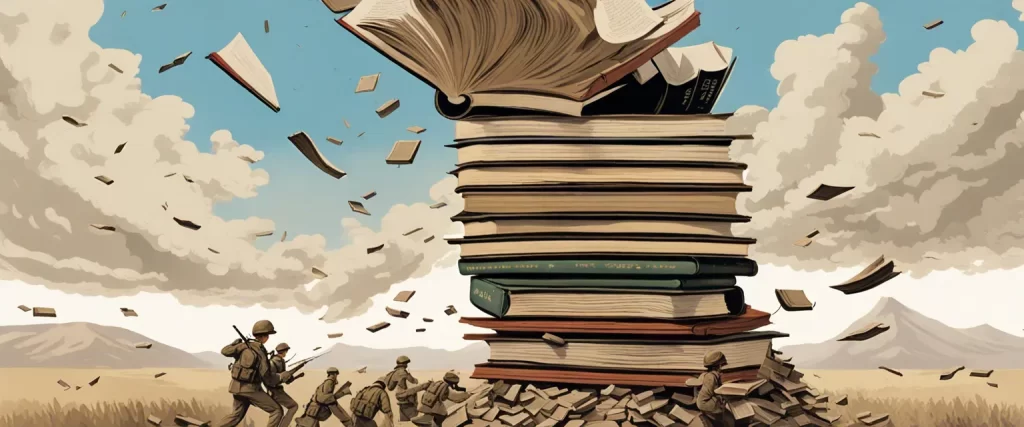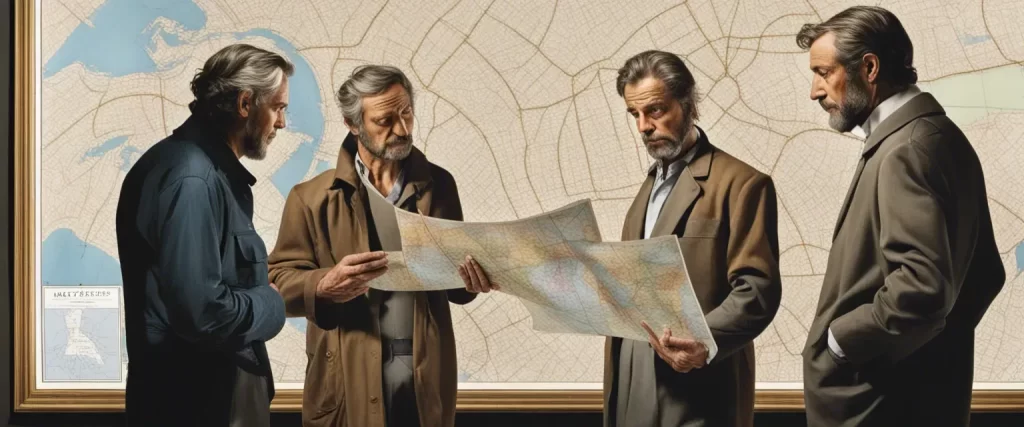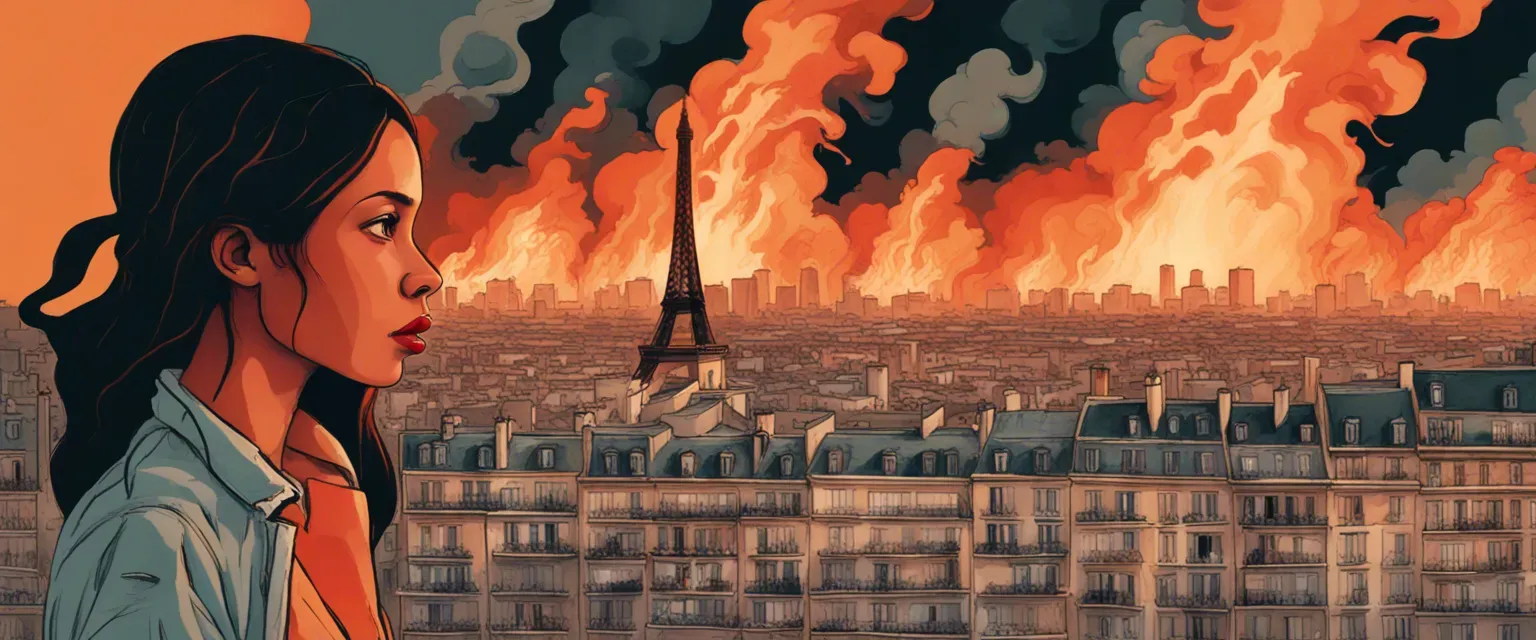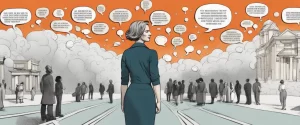——Is Paris Burning? by Larry Collins & When Books Went to War by Molly Guptill Manning
In the realm of historical literature, certain events and stories have captured the imagination of authors and readers alike, leaving an indelible mark on the collective memory. Two such narratives are brilliantly captured in Larry Collins’ Is Paris Burning? and Molly Guptill Manning’s When Books Went to War. Set against the backdrop of World War II, these books offer a unique perspective on two critical aspects of the war: the liberation of Paris and the transformative power of literature.
Is Paris Burning?, penned by the writing duo of Larry Collins and Dominique Lapierre, delves into the dramatic events of August 1944, when Paris found itself on the brink of destruction under the occupation of Nazi forces. On the other hand, When Books Went to War by Molly Guptill Manning explores an entirely different realm, shedding light on the lesser-known story of the vital role played by books in boosting the morale of American soldiers during the war.
While both books explore distinct facets of World War II, they intersect thematically by providing a glimpse into the human spirit’s resilience, triumph, and the power of hope in the face of adversity. By comparing and contrasting these narratives, this study aims to offer a comprehensive analysis of the historical context, the characters, the authors’ perspectives, and the unique storytelling techniques employed by both Collins and Manning.
Through Is Paris Burning?, readers witness the remarkable struggle for liberation as the people of Paris band together, risking their lives to overthrow their oppressors and restore the city’s freedom. In contrast, When Books Went to War explores a quieter yet equally impactful scenario – the birth of the Armed Services Editions, a program initiated by the American Library Association to provide books to soldiers, offering an escape from the horrors of war and a necessary connection to the world beyond the battlefield.
The objective of this comparative study is to delve deep into the similarities and differences between these two extraordinary accounts, examining the perspectives of the authors and critically evaluating their approach to historical storytelling. By exploring their unique narrative styles, we aim to gain greater insight into the impact of these books on scholarly and public understanding of World War II and its aftermath.
In the following chapters, we will delve into the historical context of each book, explore the motivations and inspirations behind the authors’ writing, and assess the narrative techniques employed to convey their respective stories. Additionally, we will examine the reception and lasting impact Is Paris Burning? and When Books Went to War have had on historical discourse, shedding light on the power of literature to immortalize the triumphs and struggles of the past.
Ultimately, this comparative study seeks to illuminate the shared themes and divergent approaches that make these two books essential additions to any reading list dedicated to understanding the complex tapestry of World War II. By examining the liberation of Paris and the influence of literature on soldiers’ lives, we hope to deepen our appreciation for the human spirit’s unwavering determination and the myriad ways in which stories can shape our understanding of history.
Brief Summary of Two Books
Is Paris Burning? by Larry Collins
“Is Paris Burning?” by Larry Collins is a historical account of the liberation of Paris during World War II. The book recounts the events leading up to the liberation, focusing on the German occupation of the city and the resistance movement that fought against it. It delves into the strategies employed by the resistance, the political tensions between the French factions, and the critical role played by key figures such as General Charles de Gaulle. With meticulous research and firsthand accounts from various sources, Collins provides a detailed narrative of the city’s liberation, the resulting celebration, and the political aftermath. The book explores themes of courage, patriotism, and the resilience of the French people as they fought to reclaim their city from Nazi control.
When Books Went to War by Molly Guptill Manning
“When Books Went to War” by Molly Guptill Manning tells the remarkable story of how books and reading played a crucial role in boosting the morale of soldiers during World War II. The book details the creation and impact of the Armed Services Editions (ASEs), a series of pocket-sized books specifically printed and distributed to American troops.
At the time, the U.S. military realized the importance of providing soldiers with access to books as a means of escapism and mental stimulation during their long deployments. The book chronicles the challenging process of selecting appropriate titles, negotiating with publishers, and creating the ASEs to fit the unique needs of military life, including their compact size and durability.
Manning highlights the immense popularity and demand for these books among soldiers, with millions of copies being distributed throughout theaters of war, military bases, and ships. The ASEs became cherished companions for many troops, providing a valuable respite from the hardships of war.
Additionally, the author delves into the transformative impact books had on soldiers’ lives, fostering a love for reading and intellectual growth. Many soldiers credit the ASEs with expanding their horizons, exposing them to different perspectives, and offering solace in times of despair.
Moreover, Manning explores the role of books in promoting democracy and cultural exchange. She discusses how the ASEs played a critical role in countering enemy propaganda and instilling American values in soldiers.
“When Books Went to War” is a testament to the power of literature and its ability to inspire, educate, and uplift even in the darkest of times. It sheds light on a lesser-known aspect of World War II and pays homage to the books that went to war, leaving an indelible impact on the lives of those who fought.
Comparison between Two Books

Similarities in History of Wars
Both “Is Paris Burning?” by Larry Collins and “When Books Went to War” by Molly Guptill Manning are historical non-fiction books that explore the history of war and its impact on society. Here are the similarities between the two books regarding the history of wars:
1. World War II focus: Both books primarily focus on events and aspects related to World War II. “Is Paris Burning?” examines the pivotal period in 1944 when Paris was under Nazi occupation and the efforts made to liberate it. “When Books Went to War” delves into the impact of war on the publishing industry, particularly the creation and distribution of Armed Services Editions (ASEs) during World War II.
2. Resistance movements: Both books highlight the resistance movements that emerged during World War II. “Is Paris Burning?” explores the efforts of the French Resistance in sabotaging Nazi operations and preparing the city for liberation. “When Books Went to War” discusses the role of books in boosting morale and providing solace to soldiers, acting as a form of resistance against the war’s hardships.
3. Human resilience: Both books emphasize the resilience of individuals and communities during times of war. “Is Paris Burning?” showcases the determination of Parisians to liberate their city, while “When Books Went to War” depicts the power of literature and reading in boosting the morale of soldiers and providing a sense of normalcy amidst the chaos of war.
4. Historical perspectives: Both books offer multiple perspectives on the events of World War II. “Is Paris Burning?” presents a comprehensive account that includes perspectives from French and German military officials, resistance fighters, and civilians. “When Books Went to War” showcases the experiences of soldiers, publishers, writers, and librarians, showcasing the diverse viewpoints during the war.
5. Historical accuracy: Both books are well-researched and provide historically accurate accounts of the events they discuss. They draw upon primary sources, eyewitness testimonies, and archival materials to provide a detailed and accurate portrayal of the historical events they cover.
These similarities illustrate how both books contribute to our understanding of the history of wars, particularly World War II, and shed light on the human experiences and resilience during these tumultuous times.
Divergences in History of Wars
Is Paris Burning? by Larry Collins and Dominique Lapierre tells the gripping account of the liberation of Paris during World War II. On the other hand, When Books Went to War by Molly Guptill Manning explores the role of books as a source of solace and inspiration for soldiers during the same war. While both books discuss historical events during World War II, they diverge in their focus and perspective on the war.
The major divergence between the two books lies in their primary subjects. Is Paris Burning? primarily centers around the military and political strategies that led to the successful liberation of Paris in 1944. The book provides a detailed account of the resistance movement, the activities of General Charles de Gaulle, and the larger context of the war. In contrast, When Books Went to War shifts its focus away from the battlefields to explore the impact of books on soldiers and their morale. It delves into the efforts made by the American Library Association and the United Service Organizations (USO) to provide soldiers with books and the importance of reading in boosting morale during the war.
Another divergence between the books is their narrative style. Is Paris Burning? adopts a more traditional historical approach, presenting the events in a chronological and factual manner. The authors thoroughly researched primary sources, interviewed key figures, and provided a well-documented account of the military actions that led to the liberation of Paris. Conversely, When Books Went to War leans towards a more intimate and personal storytelling style. The book draws from personal letters, diaries, and interviews to humanize the experiences of soldiers and highlight the emotional and psychological impact of books on their lives during wartime.
Furthermore, the temporal and geographical scope of both books differ. Is Paris Burning? mainly concentrates on the events surrounding the liberation of Paris in 1944, providing a comprehensive account of the military campaigns and geopolitical tensions during that period. Conversely, When Books Went to War covers a broader timespan, encompassing the entire duration of World War II. It also explores the impact of books on soldiers deployed in different theaters of war, including Europe, the Pacific, and North Africa.
In conclusion, Is Paris Burning? and When Books Went to War offer distinct perspectives on the history of wars during World War II. The former focuses on the military and political aspects of the liberation of Paris, while the latter highlights the role of books in boosting the morale of soldiers. Despite their diverging subjects, both books contribute significantly to our understanding of different aspects of the war and shed light on lesser-known historical events and experiences.

Conclusion
It ultimately depends on personal preferences and interests. “Is Paris Burning?” by Larry Collins is a historical account of the liberation of Paris during World War II. It offers a detailed analysis of the planning and execution of Operation Overlord and provides insights into the historical context of the war.
On the other hand, “When Books Went to War” by Molly Guptill Manning explores the story of the Armed Services Editions during World War II. It delves into how books were converted into pocket-sized paperbacks and distributed among American troops to provide solace, entertainment, and education during wartime.
If you enjoy riveting historical accounts with a focus on military history and the events surrounding World War II, “Is Paris Burning?” may be more suitable for you. On the other hand, if you are interested in the intersection of literature, culture, and war, “When Books Went to War” might be the better choice. Ultimately, both books offer valuable perspectives, and it is worth considering your personal interests before making a selection.



